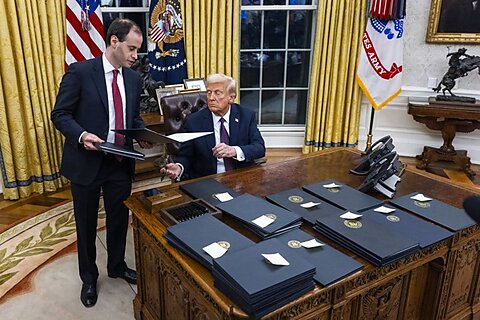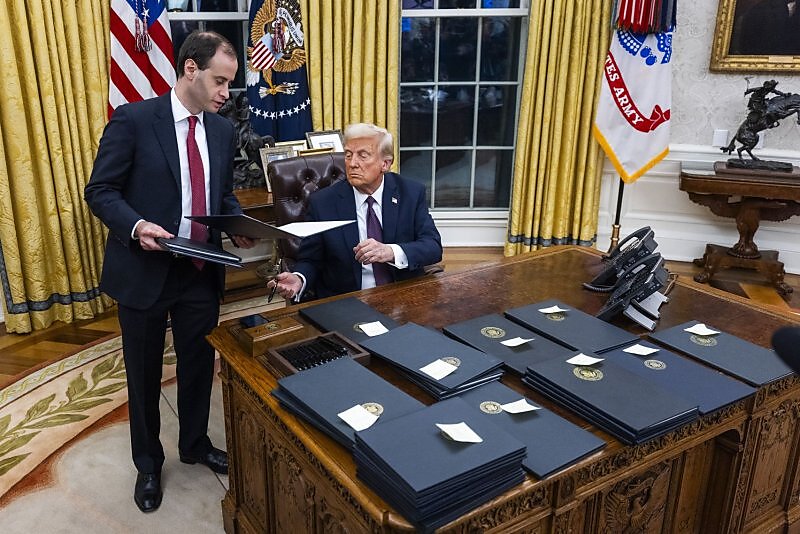May 28 started like any other day but ended with a profound triumph for my Cato colleagues and me. As Cato’s President Peter Goettler said, “Sometimes it’s the constancy and consistency of our efforts that move the climate of ideas a bit more each day in the direction of individual liberty and limited government. And only after years of effort are the results clear.” May 28 was one of those great moments where we scored tangible and immediate victories. For us, it’s cause to celebrate. But for John Moore and Tanner Mansell, it’s the day their lives began again.
Back in 2020, while leading a diving charter off the coast of South Florida, John and Tanner stumbled across an abandoned fishing line they thought was the work of poachers. They hauled in the line, released the entangled sharks, and brought the rig back to the marina after notifying state officials. Little did they know that they’d stumbled on a bona fide research project. They’d soon discover their mistake when the Department of Justice tried to send them to prison. Their crime: “stealing” the line they hauled in and left on the dock. Unfortunately, due to erroneous and incomplete jury instructions, all the government had to prove was that Moore and Mansell took the lines. The jury reluctantly returned a guilty verdict after agonizing over the case for longer than the entire trial. The protracted deliberation was punctuated by seven notes to the judge, practically begging for a way to acquit.
John and Tanner’s case was an anomaly, but not for the reason people may think. Sure, they were victims of egregious overcharging and cavalier judges who looked the other way. But in many ways, that’s what made this manifestation so emblematic of our criminal justice system. For federal prosecutors, who have become incredibly adept at turning ordinary conduct into criminal activity—terrorizing well-meaning people in the process—these are not isolated incidents; rather, they are just another day on the job. What made this matter unique was the unprecedented attention it received.
That attention culminated in something extraordinary: presidential pardons for each of them.
So, how did the unjust convictions of two men of modest means—and utterly without political connections—find their way to President Trump’s desk? While I can’t say for certain that Cato’s efforts directly led to the White House’s intervention, I do know that John and Tanner never sought pardons. My Cato colleagues and I amplified the case, taking John’s and Tanner’s plight to the media and to the highest levels of government. This prosecution—despite its unusual journey—was a textbook example of one ripe for a presidential pardon. It highlighted a clear injustice: the disproportionate application of prosecutorial power and the persistent failure of the judiciary to enforce safeguards painstakingly designed to discourage ill-conceived prosecutions and prevent palpably unjust convictions.
While some might view the nature of the charges as minor, to John and Tanner it was anything but. Our government punished their good deed, branding them lifelong felons for engaging in conduct that no reasonable person would understand to be a crime.
Reflecting on this a week out, I recall the old adage, “You can’t fight city hall.” But the reality is that injustice will always prevail if we’re not willing to fight for what we know to be right. In public interest law, you learn to brace for losses and to cherish the wins. This is more than just a win; it’s a powerful reminder to never back down and always stand up for liberty.
While I hope the ink in President Trump’s pardon pen continues to flow freely—instilling a sense of optimism among victims of egregious prosecutorial overreach—it’s unlikely to be replicated on a mass scale. These pardons should serve as a stark warning to federal prosecutors like Thomas Watts-Fitzgerald—who pursued John and Tanner with such brutish bloody-mindedness that an appeals court judge compared him to Inspector Javert from Les Misérables—to think twice before bringing charges. For the Justice Department, this vindictive prosecution wasn’t a simple mistake but a deliberate attempt to destroy the lives of two good-hearted men.
President Trump must make it unequivocally clear that the persistent failure of federal prosecutors to appropriately exercise discretion will mark the end of their careers—a potent deterrent that such actions won’t go unnoticed or unchallenged.



